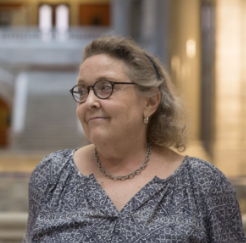Attorney Chris Wiest has filed an open meetings lawsuit against the Campbell County Board of Education on behalf of Ken Moellman, Sr., and Noah Heim.
Plaintiffs Moellman and Heim allege that the board of education violated the Open Meetings Act in a series of meetings conducted in August and September by requiring attendees to wear masks as a condition of attendance.

Plaintiffs state that they were excluded from board meetings because they refused to comply with the board’s mask requirement.
They focus on a provision of the Open Meetings Act, KRS 61.840, which provides:
“No condition other than those required for the maintenance of order shall apply to the attendance of any member of the public at any meeting of a public agency.”
It is their position that conditioning attendance at a public meeting on the wearing of a mask violates the Act since it is not necessary for the maintenance of order.
In defense of the challenged meetings, the board cites a March 2020 executive order issued by Governor Beshear suspending “statutes or regulations that conflict with efforts to ensure social distancing and other prophylactic practices designed to reduce the public health threat posed by the COVID-19.” The board also relies on an emergency regulation promulgated by the Kentucky Department of Education requiring face coverings in all school facilities.
The board notes that “an additional viewing option is provided with respect to Regular meetings of the Board, which are live-streamed via YouTube.”
Plaintiffs seek a determination that any meetings “during which Defendants [the board] required face coverings” violated the Open Meetings Act and are void; an injunction “against requiring a face covering to attend any future public meeting;” and statutory penalties in the amount of $100 per meeting as well as attorney’s fees.

Amye Bensenhaver
The Open Meetings Act states, “If the public agency makes efforts to remedy the alleged violation pursuant to the complaint, efforts to remedy the alleged violation shall not be admissible as evidence of wrongdoing in an administrative or judicial proceeding.”
The case is pending in the Campbell Circuit Court.
Neither the courts nor the Kentucky Attorney General have previously addressed the legal question: what constitutes an illegal condition on access to public meetings? The question arises in the unique, and legislatively unforeseeable, context of a global pandemic.
Arguably, security measures impacting entry into public buildings — taken in the aftermath of the 9/11 attacks — are the closest parallel.
Accordingly, there is little to guide the court in its analysis of the issue. It is, however, clear that remote attendance — as an alternative to in-person attendance — was an option during the period the challenged meetings took place.
The net effect of this lawsuit, Wiest acknowledges, is the board’s decision to return to remote meetings and discontinue in-person meetings. It is therefore difficult to see how this lawsuit strikes a blow for open government.
But perhaps that was never the point.
See the Campbell County Circuit Court complaint here.
Amye Bensenhaver is a retired assistant attorney general, open government advocate, and blogger for the University of Kentucky Scripps Howard First Amendment Center. Along with Jennifer P. Brown, former editor of the Kentucky New Era and publisher of an online news site in her hometown of Hopkinsville, she helped establish the Kentucky Open Government Coalition to provide a voice for all citizens who support government transparency and accountability.



















